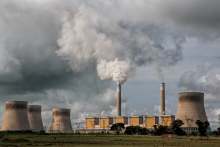While this was happening, Facebook was releasing blogs and press interviews about its commitment to climate change and tackling climate misinformation. At this point curiosity got the better of us and we launched an investigation of our own.
On The Back Burner report exposes Facebook’s inaction on climate denial
After months of pain-staking research, the full weight of evidence is now before us – and it’s worse than we first imagined:
- Climate misinformation is not mentioned once in Facebook’s public policies.
- Facebook’s existing misinformation policies – on hate speech, Covid-19, vaccines and elections – are poorly implemented, with loopholes that are regularly exploited by bad actors.
- Facebook’s main solution for climate misinformation has no grounding in communication science. The ‘Climate Science Center’ is a stand-alone page that users can visit and receive all the facts about climate change science. However, those who visit that page are not necessarily the ones that have previously seen, or regularly see, the climate misinformation. When they are, they are still not ‘inoculated’ against the myth that they saw elsewhere on the site. Leading communication scientist John Cook says of this, “it’s like feeding a person poison while handing them a brochure about vegetables.” On top of that, even if it did work, it has only been rolled out to a handful of countries so far.
Facebook’s response to our investigation has been disappointing.
Instead of reading and responding to our findings, Facebook simply repeated its standard line:
“We combat climate change misinformation by working with a global network of independent fact checking partners to review and rate content.”
It claims the extent of climate misinformation is not that high – without supplying any evidence for the claim. It also says its Climate Science Center is doing a great job, again with no supporting evidence grounded in communications science.
The threat of climate denial looms large ahead of COP26
The COP26 global conference on climate change will soon take place in Glasgow. Yet, if anything, this problem on Facebook is worsening.
A study by Avaaz, published just after ours, found climate denial content in the US reached 25 million accounts over a 60-day period at the start of 2021. An upcoming study from Stop Funding Heat will build on this, with further evidence from the UK and abroad.
The spectre of climate misinformation looms large over meetings such as COP26. In 2009, during COP15 in Copenhagen, an email leak from a group of climate scientists in the University of East Anglia supposedly dealt a fatal blow to climate change science. The leak claimed to contain incontrovertible evidence of scientific malpractice and outright lying about human’s impact on climate change published in scientific journals. Actual study of the emails revealed that these claims were false - a total storm in a teacup. But that didn’t stop news stories from distracting from the important business at hand: getting multi-lateral action on climate change before it’s too late.
That was 2009. In 2021, those who would spread such falsehoods don’t need to leak to a friendly journalist at a newspaper: they can put whatever they want directly onto Facebook and the platform will, in most cases, allow it to spread it far and wide.
Our demands for Facebook
The IPCC’s latest report this August was a sobering read.
There is no clock ‘ticking down’: climate change is here, it’s killing hundreds of thousands annually, and it’s simply a matter of how severe an impact it will have on our species.
Genuine climate action requires powerful organisations like Facebook to double down on its commitments and, much more crucially, its actions to reduce climate change impact. Facebook is talking the talk, but not walking the walk. If Facebook really cared, it would do the following:
- Stop receiving money to directly advertise climate misinformation.
- Add climate change to its Community and Advertising Standards.
- Close the loopholes that allow climate denial and other misinformation to spread to millions.
- Share, openly and publicly, information about the extent of climate misinformation on its platform.








